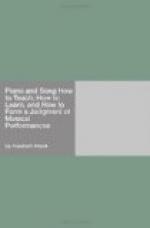My dear ladies, I warn you, generally, do not be afraid of the so-called classical, heavy music, especially Beethoven’s, if you desire to learn from it, only or chiefly, repose, lightness, facility, elasticity, graceful, delicate playing, and a fine touch. It is necessary to play such music after those brilliant qualities have already been, to a certain degree, acquired by mere studies and appropriate pieces. It is, however, still more foolish and impractical, when parents (who perhaps are skilful musicians, but who have no recollection of their own youth) hold the mistaken opinion that their children ought, from the very beginning, to practise and play only fine classical music, in order that the children’s ears may not be injured by false progressions, by insignificant finger exercises, and by easily comprehensible Italian airs, and that they themselves may not be ruined body and soul. Gracious heavens! how much pure music, suited to the piano, have not my daughters, as well as many others whom I have brought up to be fine performers, played and studied!—such, for instance, as the music of Huenten, Czerny, Burgmueller, Kalkbrenner, A. and J. Schmitt, Herz, and many others. Who finds fault now with their musical culture, with their sound taste, or their want of love for classical music? What a long road a child has to travel through Etudes of Cramer, Moscheles, and Chopin, before he comes to Bach’s Well-tempered Clavichord, or before he is able, or ought even, to study Beethoven’s Sonate Pathetique! It is not well, though quite




